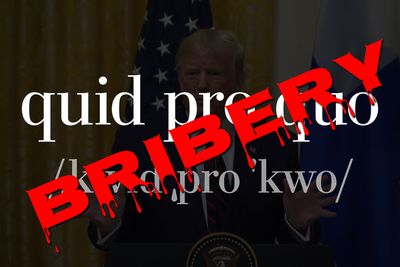At the heart of the House impeachment inquiry into President Trump's Ukraine dealings is a Latin term that is easy to translate but legally difficult to define and prove.
Democrats [VOA commentary - The House] beginning public hearings next week with three key witnesses are focused on whether Mr. Trump engaged in an inappropriate quid pro quo. Specifically, they are probing the president's temporary withhold-ing of hundreds of millions of dollars in foreign aid to Ukraine, allegedly to pressure the country into opening investigations related to Democratic presidential candidate Joe Biden and the 2016 election.
A quid pro quo—literally "something for something" or "one thing for another"—is often associated with political corruption, but it isn't synonymous. And determining when a quid pro quo is unlawful or just hardball politics has been one of the most contentious areas of criminal law.
To successfully impeach the president, Democrats don't necessarily have to connect the Ukraine controversy to a specific crime. Charging the president with a more general abuse of power likely suffices under the constitution's definition of impeachment, legal scholars said.
But how federal courts have handled quid pro quos in the past offers a window into how the impeachment inquiry could unfold for Mr. Trump and what arguments his supporters and critics will deploy.
The key bribery offenses in the federal criminal code generally require evidence of an unlawful quid pro quo. That has been defined by the courts as an "official act" or "formal exercise of governmental power" traded for money or anything of value.
Some legal scholars point to Section 201(b)(2) of the federal criminal code as the most relevant offense. Some legal commentators have suggested the president may have run afoul of campaign-finance laws, but the quid-pro-quo allega-tions represent more serious claims of misconduct.
The bribery statute makes it a crime for a public official to corruptly demand or seek "anything of value personally" in return for "being influenced in the perfor-mance of any official act."
Applying that statute, the allegation would be that the president (the public official) sought dirt on a political rival (the thing of value) in exchange for releasing aid (the official act).
Mr. Trump has denied any quid pro quo and called the impeachment inquiry a hoax. Several witnesses, including the U.S. ambassador to the European Union, have laid out evidence that security aid to Ukraine was linked to investigations sought by Mr. Trump.
The fact that Ukrainian President Volodymyr Zelensky denied feeling pressure from Mr. Trump during their July phone call isn't exonerating, and nor is the fact that the aid was suspended only temporarily and released without any probes into the Bidens and Burisma Group, a Ukrainian gas company where Mr. Biden's son, Hunter, had sat on the board.
Generally, a quid pro quo doesn't need to be successful or explicitly spelled out to be unlawful. And there is no requirement that both the giver and recipient of a bribe have a corrupt intent.
But other factors cast doubt on the criminality of Mr. Trump's dealings with Ukraine. For one, it isn't clear that an investigation into Burisma Group would constitute "anything of value" under the law.
A thing of value exchanged for an official action doesn't have to be a good or service with a clear price tag. Judges have broadened the scope to include more intangible items, such as conjugal visits for a federal prisoner.
But legal experts can't point to any case law where a govern-ment investigation was deemed a thing of value in a corruption prosecution.
At the same time, courts in recent years have drawn sharper lines between ordinary political horse-trading and corrupt schemes. A series of Supreme Court rulings—such as the 2016 overturned conviction of former Virginia Gov. Bob McDonnell—have narrowed the scope of bribery statutes and made it harder for prosecutors to prove a politician broke the law.
"Existing corruption statutes are ill-equipped to address the type of conduct the president was alleged to have committed," said Luke Cass, a white-collar defense attorney in Washington, D.C., and a former federal prosecutor.
Skeptics of the House im-peachment inquiry into Mr. Trump have also questioned whether the president had a corrupt intent—a required element of a quid-pro-quo crime—in his interactions with Mr. Zelensky. Kenneth Starr, who led investigations of former Presi-dent Bill Clinton, said in a podcast last month that the number of people listening in on the July 25 call suggests Mr. Trump wasn't trying to hide his actions. "That goes to his intent. There is no corrupt bargain," Mr. Starr said. [VOA commentary: In a highly unusual move, the call transcript of Trump's July 25 call with the Ukrainian President was immediately moved to a highly classified "code word" server.]
Other defenders say even if a quid pro quo happened, such presidential political skulduggery isn't without precedent in recent times [VOA commentary: sample?]
Sen. Lindsey Graham (R., S.C.), chair of the Senate Judi-ciary Committee, has also argued that the Trump adminis-tration's Ukraine policy was too incoherent to be criminal. Other defenders say the president's sweeping executive authority over foreign affairs makes it more difficult to allege a criminal quid pro quo.
A quid pro quo could be undefined in the criminal code but at the same time be a troubling abuse of power, said Stanford criminal law professor David Alan Sklansky. Then the question would be whether Mr. Trump's foreign policy put his private interests above the nation's.
"Just because something isn't a crime doesn't mean it's not an impeachable offense," said Mr. Sklansky.
Wall Street Journal, November 10, 2019
###
November 10,2019
Voices4America Post Script. This is the Wall Street Journal overview of what constitutes a “quid pro quo." Some of us prefer plain ole “Bribery and Extortion." #TrumpBribed #TrumpExtorted #ImpeachRemove
